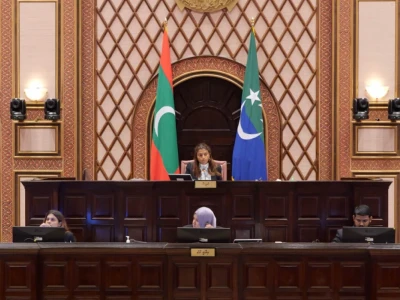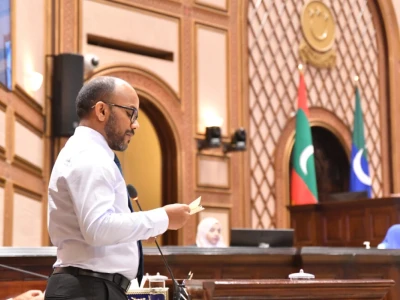
IMF's full advice: hike taxes with spending cuts
Statistics released by the Finance Ministry show that the government's expenditure increased by MVR 4.3 billion this year compared to last year.
Top Stories
By
Ahmed Naif
A country surveillance delegation of the International Monetary Fund (IMF), which will remain in the Maldives until 26 September, met with the parliament's Public Finance Committee and the Economic Committee to assess the economic situation in the country. Members of the committees asked the IMF why they approve increasing GST and TGST at a time when there might be a fiscally difficult year ahead for the Maldives.
While the IMF's tourism forecast for the country is challenging, increasing TGST will increase the price of a holiday in Maldives and might discourage potential travellers. The other concern is that the government has a policy of earnest spending and that their policies clash when taxes are always being increased.
In response to those concerns, mission head Tidian Kinda clarified their doubts.
He said the Maldives has a relatively high capital expenditure compared to other similar economies. He said that a large part of the expenditure is being incurred by state-owned companies.
He also said that the prices of many basic commodities and services have been maintained in the Maldives with blanket subsidies from the government. Tidian revealed how increased cost of public expenditure will ultimately be passed on to the public since the expenses have to be compensated for.
"The way to cover these huge expenses is to increase taxes. The cost of subsidies is very high when prices are already high with inflation. Otherwise, the government will not be able to earn more income,” Tidian said.
He said that the tax hike was not the only end of it. He also said that the IMF's advice would be to reduce the government's expenditure at this time.
"Increasing tax is not a solution; along with the tax increase, the government needs to cut back on expenses. The two actions have to be executed together,” Tidiane said.
Government in opposite direction
Statistics released by the Finance Ministry show that the government's expenditure increased by MVR 4.3 billion this year compared to last year. The government spent MVR 25.2 billion this year by the end of the first week of September. The government has spent MVR 5.9 billion more than the revenue earned.
The government has decided to halt some projects; reduce expenditure staked above MVR 5,000 and even stopped recruitment for new civil service posts. However, these decisions have not reduced the overall expenditure. Or perhaps it is because the government has not completely executed these measures?
The government continues to invest in new projects and recruit more people. The people find it hard to believe that the government is acting visibly to reduce expenditure. However, the finance ministry says expenses have already been reduced.
Tidiane believes cost-cutting should be seriously considered at the moment. "This can only be done together," he said. In this regard, he noted the importance of the public and all state agencies support in reducing expenditure.
"Members of the parliament should also say where expenses can be reduced. We also need support from them,” Tidian said.
Tidian also highlighted some of the ways from the information gathered during the IMF's visit that could reduce expenditure. He said that instead of doing everything, the government should release some development projects to private parties that can complete it for profit.
He noted the housing market. Tidian said that while there is a huge demand for housing in the Male region, social housing should not be developed by the government alone. He said that it was impossible for the government to execute everything alone.
"There are a lot of government businesses in the Maldives. Instead, the space for private companies should be expanded,” Tidiane said.
Burden of subsidies cannot be borne forever
Parliament members questioned the IMF on how the government could reduce the inflated price burden on the public without providing subsidies at a time when inflation was rising. Tidian said the IMF's advice is to provide financial assistance to those who need it after holding real prices in the market. In this regard, he said that basic food, health services and reducing electricity prices should be done for those who cannot afford it.
"This cannot be done by providing subsidies forever. The burden cannot be borne by the government for long,” Tidian said.
The whole gist of the IMF team’s message is that ultimately the common man will have to bear the cost of the government trying to run a welfare state. Free health services and subsidised electricity for all will accrue heavy expenditure for the government in the long run. The results are already manifesting in the form of the public having to pay more for all goods and services.




